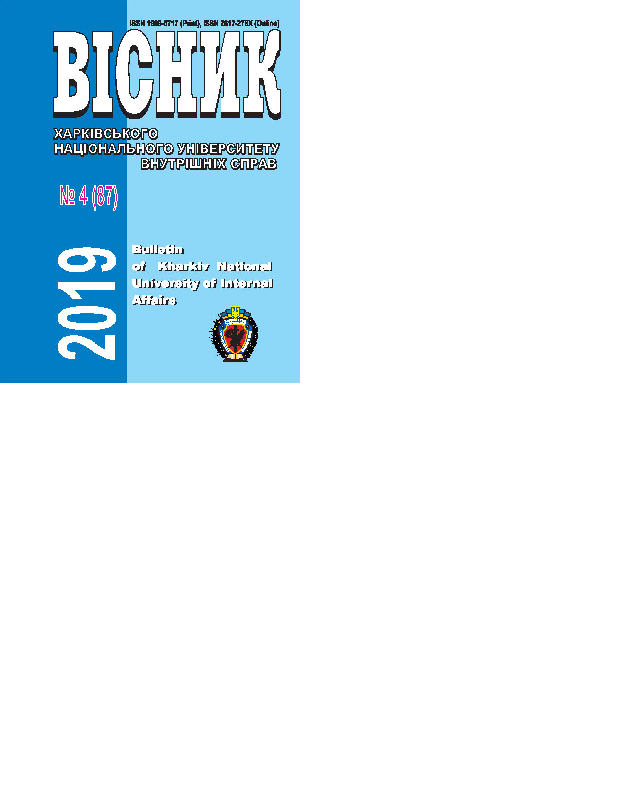Perspectives for Using the Programmatic Approach within the Activities of Law Enforcement Agencies of Ukraine
DOI:
https://doi.org/10.32631/v.2019.4.17Keywords:
law enforcement activity, criminal and procedural, investigative, operative and search activity, activity of a prosecutor and a judge in criminal proceedings, criminalistic programs, algorithms, programming of law enforcement activity.Abstract
On the basis of the analysis of the state of research of algorithms and programming of investigative activity in criminalistics, the author has grounded the expediency of applying a programmatic approach to solving typical tactical problems in other areas of law enforcement activities. Theoretical prerequisites for the development of procedural action programs by law enforcement entities in Ukraine (criminal and procedural, operative and search, administrative and jurisdictional) have been determined. The necessity of intensifying scientific researches in the direction of development of branch concepts of tactics of different types of law enforcement activities and their constituent elements (the concept of tactics, tactical situation, tactical task, tactical technique and system of tactical techniques and their situational predetermination) has been determined. In particular, the author has determined that the investigator is not the only possible subject of being armed with tactical recommendations in the form of algorithms and programs. The subject matter of the research of criminalistic tactics is not only investigative activity, but also operative and search, judicial and prosecutorial activity in criminal proceedings. Equally important is the tactical completion of administrative activities of law enforcement agencies and, on this basis, the establishment of programs of action by police officers, border guards, National Guard, customs service, etc. in exercising their administrative powers for the protection of public order and state border, actions in emergency situations, administrative cases, etc. The justification of the possibility of applying a programmatic approach within administrative activities of law enforcement agencies is the uniformity of administrative and jurisdictional, criminal and procedural activities, which are covered by a single concept of “law enforcement activity”. It has been established that the programmatic approach can be applied in any sphere of law enforcement activity, if: 1) such activity is situational in nature, and it is possible to perform the tasks arising during the implementation of this activity through consistent implementation of certain actions; 2) there is the need to streamline these activities by providing tactical recommendations in the modern form with the use of computer technologies and the ability to use them directly in the course of action, in “field conditions”; 3) the level of elaboration of theoretical bases of tactics of a specific type of law enforcement activity is sufficient (the concept of tactics, tactical situation, tactical task, tactical technique and system of tactical techniques has been elaborated).
Downloads
References
Maksymyshyn N.M., 2016. Trial: trial and forensic investigation [Sudovyi dopyt: protsesualne i kryminalistychne doslidzhennia]. Abstract of Ph.D. dissertation. Ivan Franko National University of Lviv.
Nikolaiuk S.I., 2009. Algorithmization of actions of operatives in the process of prompt search for signs of economic crimes by using the possibilities of fuzzy logic [Alhorytmizatsiia dii operatyvnykh pratsivnykiv v protsesi operatyvnoho poshuku oznak hospodarskykh zlochyniv shliakhom vykorystannia mozhlyvostei nechitkoi lohiky]. Pìvdennoukraïnsʹkij pravničij časopis – South Ukrainian Law Journal, No. 1, pp. 193-202.
Sokurenko V.V. (ed.), 2017. Administrative activity of the police of Ukraine [Administratyvna diialnist orhaniv politsii Ukrainy]. Kharkiv: Kharkivskyi natsionalnyi universytet vnutrishnikh sprav.
Khan O.O., 2016. Theoretical bases of planning and programming of investigative (search) actions [Teoretychni osnovy planuvannia ta prohramuvannia slidchykh (rozshukovykh) dii]. Ph.D. dissertation. Yaroslav Mudryi National Law University.
Shatalov A.S., 2000. The concept of forensic algorithms and crime investigation programming [Ponyatie kriminalisticheskoi algoritmizatsii i programmirovaniya rassledovaniya prestuplenii]. Gosudarstvo i pravo – State and law, No. 8, pp. 29-39.
Biryukov G.M., 1999. Operational-search tactics: theoretical understanding of the concept, content and structure. Current issues in the fight against organized crime [Operativno-rozysknaya taktika: teoreticheskoe osmyslenie ponyatiya, soderzhanie i struktura]. In: Lugansk Institute of Internal Affairs. Problems of improving legislation and the practice of its application, taking into account the forecast of crime [Problemy sovershenstvovaniya zakonodatel`stva i praktika ego primeneniya s uchetom prognoza prestupnosti]. Lugansk, 20-21 May. Lugansk: RIO LIVD MVD Ukrainy. Pp. 3-9.
Pavlenko S.O., 2018. Essence and content of operational and successful situation [Sutnist ta zmist operatyvno-rozshukovoi sytuatsii]. Forum prava – Forum of law, [online] No. 4, pp. 42-63. http://doi.org/10.5281/zenodo.1495589.
Shendryk V.V., 2005. Operational combination: theoretical, legal and organizational-tactical foundations (based on criminal police activities) [Operatyvna kombinatsiia: teoretyko-pravovi ta orhanizatsiino-taktychni osnovy (za materialamy diialnosti kryminalnoi militsii)]. Abstract of Ph.D. dissertation. Kharkiv National University of Internal Affairs.
Arotsker L.E., 1964. The use of forensic data in litigation [Ispol`zovanie dannykh kriminalistiki v sudebnom razbiratel`stve]. Moscow.
Sycheva O.I., 2009. Judicial investigation tactics [Taktika sudebnogo sledstviya]. Ph.D. dissertation. Kazan' State University.
Vilhushynskyi M.Y., 2010. Tactics of judicial investigation in criminal justice systems [Taktyka sudovoho slidstva v systemi kryminalistyky]. Kharkiv: Pravo.
Miroshnichenko Yu.M., 2011. Legal and tactical and organizational basis of the judicial review of criminal justice [Pravovi i taktyko-orhanizatsiini osnovy sudovoho rozghliadu kryminalnykh sprav]. Abstact of Ph.D. dissertation. Open International University of Human Development “Ukraine”.
Subbotin E.A., 1993. Tactics of public prosecutor's actions [Taktika obshchenadzornykh deistvii prokurora]. Kharkiv: IPKK.
Turkot M. and Shcherbakova H., 2015. Tactics of presenting evidence by a prosecutor during the trial of juvenile proceedings [Taktyka podannia dokaziv prokurorom pid chas sudovoho rozghliadu kryminalnykh provadzhen shchodo nepovnolitnikh]. Naukovij časopis Nacìonalʹnoï akademìï prokuraturi Ukraïni, No. 1, pp. 170-178.
Sokolenko O., 2012. Directions of law enforcement activity: peculiarities of theoretical understanding [Napriamky pravookhoronnoi diialnosti: osoblyvosti teoretychnoho rozuminnia]. Vìsnik. Ûridičnì nauki (Kiïvsʹkij nacìonalʹnij unìversitet ìmenì Tarasa Ševčenka) – Bulletin of Taras Shevchenko National University of Kyiv. Legal Sciences, Iss. 93, pp. 69-72.
Dnipropetrovsk State University of Internal Affairs, 2017. Special tactical training [Taktyko-spetsialna pidhotovka]. Dnipro: Dnipropetrovskyi derzhavnyi universytet vnutrishnikh sprav.




